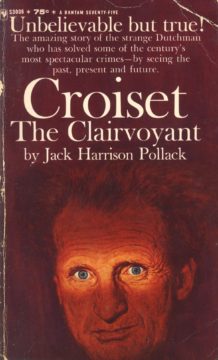Nienke Groskamp in the European Review of Books:
 In Hound of the Baskervilles (1902) by Sir Arthur Conan Doyle, Sherlock Holmes examines a note written on a snippet from The Times. He concludes its author was an « educated man who wished to pose as an uneducated one, and his effort to conceal his own writing suggests that that writing might be known. » Dr. Mortimer calls it guesswork, but Holmes disagrees: « It is the scientific use of the imagination. »
In Hound of the Baskervilles (1902) by Sir Arthur Conan Doyle, Sherlock Holmes examines a note written on a snippet from The Times. He concludes its author was an « educated man who wished to pose as an uneducated one, and his effort to conceal his own writing suggests that that writing might be known. » Dr. Mortimer calls it guesswork, but Holmes disagrees: « It is the scientific use of the imagination. »
On the cusp of science and imagination — that is where Holmes operates. And, like many other fictional brilliant crime-solvers — whether their talent comes from genius-level observational skills (like Monk or The Mentalist’s Patrick Jane) or psychic abilities (like Medium’s Allison DuBois) — he works outside of the institutional police structure. On BBC’s Sherlock, Officer Lestrade refuses to let Sherlock do a medical examination, telling him, « I’m breaking every rule letting you in here. » Holmes responds: « Yes … Because you need me. » Lestrade lowers his eyes in resignation. « Yes, I do. God help me. »
Holmes is fictional, but the police’s openness to — even dependence on — the perspective of unconventional outsiders most definitely isn’t.
More here.
